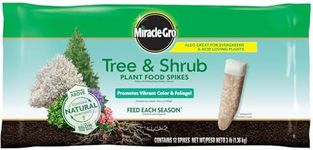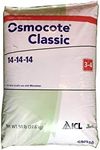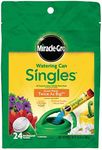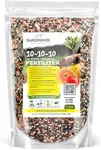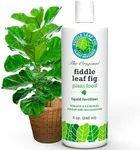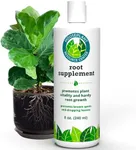Buying Guide for the Best Fertilizer For Arborvitae
Choosing the right fertilizer for your arborvitae is crucial to ensure healthy growth and vibrant foliage. Arborvitae, like all plants, require specific nutrients to thrive, and the right fertilizer can provide these in the correct proportions. When selecting a fertilizer, it's important to understand the key specifications and how they relate to the needs of your arborvitae. This guide will help you navigate through the essential specs and choose the best fertilizer for your plant.NPK RatioThe NPK ratio represents the proportions of nitrogen (N), phosphorus (P), and potassium (K) in the fertilizer. This ratio is important because each of these nutrients plays a different role in plant health. Nitrogen promotes leafy growth, phosphorus supports root development and flowering, and potassium enhances overall plant health and disease resistance. For arborvitae, a balanced NPK ratio like 10-10-10 or one slightly higher in nitrogen, such as 12-6-6, is often recommended. If your arborvitae is young or newly planted, a higher phosphorus content can help establish strong roots.
Type of FertilizerFertilizers come in various forms, including granular, liquid, and slow-release. Granular fertilizers are easy to apply and provide nutrients over a period of time as they break down in the soil. Liquid fertilizers are fast-acting and can be applied directly to the soil or foliage, making them ideal for quick nutrient boosts. Slow-release fertilizers gradually release nutrients over several months, reducing the need for frequent applications. For arborvitae, slow-release fertilizers are often preferred as they provide a steady supply of nutrients, promoting consistent growth without the risk of over-fertilization.
Organic vs. SyntheticFertilizers can be either organic or synthetic. Organic fertilizers are made from natural materials such as compost, manure, or bone meal, and they improve soil structure and microbial activity. Synthetic fertilizers are chemically manufactured and provide nutrients in a readily available form. While synthetic fertilizers can offer quick results, organic fertilizers are generally better for long-term soil health and sustainability. If you prefer an eco-friendly approach and want to improve your soil's health over time, organic fertilizers are a good choice for your arborvitae.
MicronutrientsIn addition to the primary nutrients (NPK), plants also need micronutrients such as iron, manganese, zinc, and copper in smaller amounts. These micronutrients are essential for various physiological functions and overall plant health. A good fertilizer for arborvitae should include these micronutrients to ensure balanced nutrition. Check the fertilizer label to see if it contains a comprehensive mix of micronutrients, especially if your soil is deficient in any of these elements.
Soil pH CompatibilityThe pH level of your soil can affect the availability of nutrients to your arborvitae. Arborvitae generally prefer slightly acidic to neutral soil (pH 6.0-7.5). Some fertilizers are formulated to adjust the soil pH, making nutrients more accessible to the plant. Before choosing a fertilizer, test your soil's pH and select a product that is compatible with your soil conditions. If your soil is too acidic or alkaline, you may need to amend it with lime or sulfur to achieve the optimal pH range for arborvitae.


